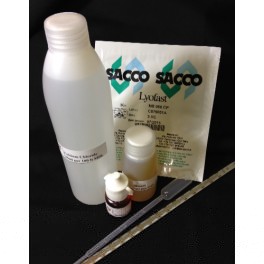Yoghurt
Cheese Making Shop, South Africa up and running!
Hi, Cheese Making Fans
Just follow the link if you are interested in cheese making and living in South Africa:
http://cheesemaking.co.za/2014/08/26/our-cheese-making-shop-is-up-and-running/
The online shop is taking orders for South African hobby cheese makers. If you have never made cheese before, give as a call or drop an e-mail so that we can assist you in buying the right ingredients and equipment for the type of cheese that you want to make.
Direct link for the cheese making shop to buy rennet, cultures, wax etc:
http://www.cheesemaking.co.za/shop
They are open for business!
Eat your cheese and drink your milk,
Leon the Milkman
Dairy and Cheese Consultant
Cheese Supplies, Cheese Making Suppliers, Cape Town, South Africa
We had a great cheese course!
Sacco Cheese and Yoghurt Cultures
Clerici-Sacco started out as Caglificio Clerici, a privately owned company manufacturing enzymes for cheese production and was originally established in 1872.
In 1984 the Italian company decided to broaden its product range and markets by purchasing Sacco and creating the Clerici-Sacco Group which is still owned by the founder’s descendants.
Thus Sacco cultures bring a long heritage of cheese production with generations of expertise to the South African Market.
An extensive list of cultures for the dairy and meat markets are available from Sacco, and specifications can be viewed on their website at saccosystem.com under products.
Some of the cheeses that are made from their cultures are Sweet Milk Cheeses like Gouda, Edam, Danbo – Hard Cheeses like Parmesan, Pecorino, Gruyere – Pasta Filata Types like Mozzarella, Provolone and Soft Cheeses like Camembert and Brie.
Many South African Champion cheese makers have found these real Italian Cultures to be superior in every category and have won awards with them.
Where did that yoghurt taste come from?
Hi, Yoghurt Fans
When you have a funny taste in your yoghurt it is not always funny 😉
If the factory manufactures an unflavoured yoghurt and then add flavours, the first question should be if the taste is present in the unflavoured yoghurt as well. If it is, then it cannot have come from the flavour or fruit that was added, right?
So now it must come from anything that is added before that point, like the milk itself, the stabilisers, the sugar/sweeteners or base.  Get to every ingredient, and make sure it is from the same batch.  For example, get milk from the same farmer on the same day, etc.
Some of the yoghurt can be used to innoculate autoclaved/UHT/longlife milk and if the same taste is perceived after the milk is set, then the taste is microbial, right?  I say this because if the 3% or so yoghurt with the funny taste was mixed into milk and no taste was evident and after incubation the taste is there, then it must be microbial, I think.
Hope you found this of value.
Kind regards,
Leon the Milkman
Yoghurt Sweetness
Hi, Yoghurt Fans
You might notice that when you eat some full fat and low fat yoghurt from the same company that the low fat stuff is usually much sweeter than the full fat version.
The reason is that the full fat version tends to cover your taste buds in lovely butterfat, dulling them to the sugar’s sweetness and that most companies do not compensate for this by lowering the sugar content of their low fat products.
So the low fat yoghurt could have even less calories 😉
Check it out – it’s true.
Â
Kind regards,
Leon the Milkman
Yoghurt Stabiliser
Hi, Yoghurt Fans
It should be no secret that commercial yoghurt has stabilisers added. What is that? Stabilisers range from starch based, to gums to gelatin(not in Kosher products). Anybody that has ever made yoghurt will know that because of the acidity of the product some free moisture will form whenever we scoop some out or break the set structure in some way.
Because commercial yoghurt has to be transported as well it is thus essential that some stabiliser be added. Some are just for thickening the product and others have functional properties as well, like giving a creamy mouthfeel.
When using stabilisers in yoghurt we must determine the stabiliser to be acid tolerant(yoghurt pH about 4-4.5) and enzyme tolerant. Best to ask the manufacturer if you are planning to make you own stabiliser mix or wanting to try something new.
Kind Regards,
Leon the Milkman
